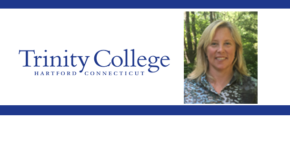 Taking a walk in the woods can be good for brain health.
Taking a walk in the woods can be good for brain health.
Susan Masino, professor of applied science at Trinity College, explores why forests are important to our health.
Dr. Masino is the Vernon Roosa Professor of Applied Science at Trinity College and a joint appointment in Neuroscience and Psychology. Her research focuses on promoting and restoring brain health, with a particular interest in adenosine, and on the relationship among metabolism, brain activity and behavior. For nearly 100 years a metabolic therapy called a “ketogenic diet” has been used to treat seizures, and recent mechanistic insights – including the role of adenosine – hold translational implications for brain health and diverse disorders.
In addition to her laboratory research Dr. Masino is interested in how public polices can improve brain health – with a special focus on New England’s amazing forests – and involved in local educational and environmental issues.
Forests
Forests are essential to life, and emerged 380 million years ago. They have recovered from catastrophic volcanic eruptions, ice ages, and meteor strikes. European settlers deforested much of New England, and today we appreciate forests for many values – including human health. Forests offer exercise, solace, medicines and biodiversity; new species are still being discovered in New England.
As a neuroscientist I know the link between forests and brain health cannot be overlooked: we face increasing costs for disorders ranging from Alzheimer’s disease to addiction. Lifestyle modifications are effective and successful, and forests offer exercise, mindfulness and stress reduction – naturally. US veterans suffering from PTSD can reduce medication use, and research on cardiovascular, immune and neurological systems is expanding worldwide. A forest can also increase kindness, altruism, and generosity by provoking awe – the sense of wonder you feel in the presence of something beyond your understanding.
We have very little original forest in New England, but we can plan, now, to have old local forests in the future. Even a small forest is important – at 40 acres, Belden Forest in downtown Simsbury CT is the latest addition to the Old Growth Forest Network. Our well-being depends on wild areas – connecting between human generations, increasing in biodiversity and resilience over time – like they have for millions of years. Letting our forests grow is also the most rapid, efficient and cost effective thing we can do to sequester carbon and combat climate change. Today, New England forests are still young and growing and have the potential to store a lot more carbon – while controlling floods and buffering temperature fluctuations. Knowing that forests can treat disease, give us new medicines, and help us survive climate change means that we really can see beyond the trees.

Comments
One response to “Susan Masino, Trinity College – Forests”
Not just forests. Prairies, deserts, mountains, oceans, islands – any open space can do the same.